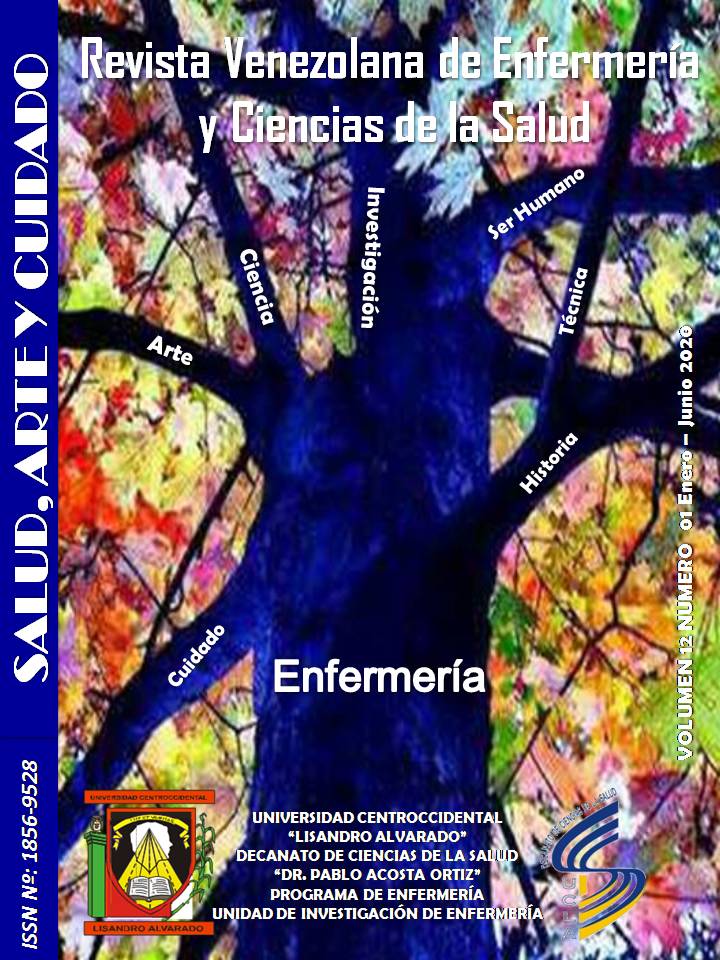Modern nursing its impact of humanized care in the main health center.
Keywords:
modern nursing, humane care, professional practiceAbstract
The purpose of the article is to reflect on modern nursing and its impact on humanized care in patients who attend the Central University Hospital “Dr. Antonio Maria Pineda” from the city of Barquisimeto, Lara state. This modern profession and indissolubly associated with the hospital institution, but also in popular clinics, among others, were founded or re-founded with a modern sense and autonomy of profession in the middle of the 19th century. Today, it is a university-level career that is dedicated to the care and care of patients, which is why they train professionals with a critical sense and a level of human and social responsibility. It should be noted that one of the humanistic professions of a social nature is nursing; whose practice must be based on offering humanized care, where not only the sick person is treated, but also the different dimensions of the human being who needs care are addressed, of course these care have changed in different times and they have evolved, that is; They have been adapting to the times, using techniques and procedures in accordance with scientific and technological advances. In conclusion, the care in the nursing professional is built through the actions, the relevance given to it, the opportune attention, the form and attitude that it carries out with the person, so it is necessary for nursing to understand that caring involves and shares the human experience through a transpersonal and respectful relationship. This knowledge allows the nurse to improve the care processes in any health situation that the patient has.
Downloads
References
Nightingale, Florence. Notes on Nursing and other writings Kaplan Publishing, New York.2008
URBINA. Competencias laborales de enfermería. (4ta Ed.) México: McGraw Hill.2006.
Fernández, J. Elementos que consolidan el concepto de profesión. Notas para su reflexión. Revista Electrónica de Investigación Educativa.3 (2).
Colliere. Marie F. (1993). Promover la Vida. 1 ed. Madrid: McGraw-Hill; 2001.
Watson, Jean. Nursing Human science and Human Care: A Theory of Nursing. New York: National League of Nursing .1988.
Espinoza L, Huerta K, Pantoja J, Velásquez W, Cubas D, Ramos A. El cuidado humanizado y la percepción del paciente en el Hospital Es Salud Huacho. Perú. Rev. Ciencia y Desarrollo, 2011; 13:1-9.
Baggio, M. Significado de cuidado para profesionales del equipo de enfermería. Revista Electrónica de Enfermería. Disponible en http://www.fen.ufg.br/revista/revista8_1/original_01.htm [Consultado el 12 de Noviembre de 2019].
Consejo Internacional de Enfermería. La investigación de Enfermería: instrumento de acción. Disponible en http://www.icn.ch/matters_researchsp.htm [Consultado el 14 de agosto de 2008].
García, M. Administración y gestión. Colección Enfermería S21. (2da Ed.) Madrid: Difusión Avances de enfermería (DAE). 2011
Medina Moya, J.L. Práctica Educativa y Práctica de Cuidados Enfermeros desde una Perspectiva Reflexiva. Revista de Enfermería. Albacete (15).Abril 2002. http://www.uclm.es/ab/enfermeria/revista/numero%2015/numero15/pr%C3%A1ctica_educativa_y_pr%C3%A1ctica_de.htm
Medina Moya, JL. De la noción de reflexión. Escritos de enfermería. Disponible en : www.agoradeenfermeria.com/CAST/num001/escrits.html
Rozada, J. Formarse como profesor. Ciencias Sociales, Primaria y Secundaria Obligatoria. (Guía de textos para un enfoque crítico). Madrid: Akal. 1997
Published
How to Cite
Issue
Section

This work is licensed under a Creative Commons Attribution-NonCommercial-ShareAlike 4.0 International License.
Derechos del/de autor/es a partir del año de publicación
Esta obra está bajo la licencia:
Creative Commons Reconocimiento-NoComercial-CompartirIgual 4.0 Internacional (CC BY-NC-SA 4.0)
Las opiniones expresadas por los autores no necesariamente reflejan la postura del editor de la publicación ni de la UCLA. Se autoriza la reproducción total o parcial de los textos aquí publicados, siempre y cuando se cite la fuente completa y la dirección electrónica de esta revista. Los autores(as) tienen el derecho de utilizar sus artículos para cualquier propósito siempre y cuando se realice sin fines de lucro. Los autores(as) pueden publicar en internet o cualquier otro medio la versión final aprobada de su trabajo, luego que esta ha sido publicada en esta revista.







